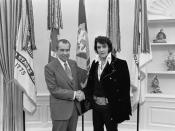Indeed, it is President Richard Nixon who comes to mind when we hear "Watergate". However, it is important to look at Nixon's history to understand his actions as President of the United States. Nixon first ran for office in 1960 against victorious President John F. Kennedy. Dismayed, Nixon in 1962 ran for the position of governor of California. Defeated once again, Nixon eager for power decided to reinvent himself with a new image, and thus, became the leader of the Republican Party in 1964. After four years, he finally triumphed over Hubert Humphrey to be the U.S.'s thirty-seventh president. Nixon's presidency and ultimately to his resignation will be the perspective of this paper.
President Nixon came into office with a Pandora's Box of problems to deal with. The Nation was painfully dived, with economic turbulence in the cities and war overseas. However, once in office, President Nixon tackled head on the issues that had plagued the U.S.
His accomplishments while in office included revenue sharing, the end of the draft, new anticrime laws, introduced affirmative action, used price control to keep a lid on inflation, and initiated a broad environmental program. He also kept his campaign promise and appointed Justices of conservative philosophy to the Supreme Court. Most dramatic of the events of his first term was in 1969, when American astronauts made the first moon landing (whitehouse.gov).
Some of his most acclaimed achievements came in his second term's quest for world stability. During his visits in 1972 to Beijing and Moscow, he reduced tensions with China and the U.S.S.R. His summit meetings with Russian Leader Brezhnev produced a treaty to limit strategic nuclear weapons. In 1973, he announced an accord with North Viet Nam to end American involvement in Indochina. Nixon's Secretary of State, Henry Kissinger, negotiated disengagement...


